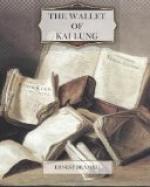“For this reason, gazer, and because the matter touches you more closely than, in your self-imagined security, you are prone to think, deal expediently with the time at your disposal. Look twice and lingeringly to-night upon the face of your first-born, and clasp the form of your favourite one in a closer embrace, for he by whose hand the blow is directed may already have cast devouring eyes upon their fairness, and to-morrow he may say to his armed men: ‘The time is come; bring her to me.’”
“From the last sentence of the well-intentioned and undoubtedly moderately-framed notice this person will take two phrases,” remarked Tung Fel, folding the written paper and placing it among his garments, “which shall serve him as the title of the lifelike and accurately-represented play which it is his self-conceited intention now to disclose to this select and unprejudiced gathering. The scene represents an enlightened and well-merited justice overtaking an arrogant and intolerable being who—need this person add?—existed many dynasties ago, and the title is:
“Thetime is come!
By whose hand?”
Delivering himself in this manner, Tung Fel drew back the hanging drapery which concealed the front of his large box, and disclosed to those who were gathered round, not, as they had expected, a passage from the Record of the Three Kingdoms, or some other dramatic work of undoubted merit, but an ingeniously constructed representation of a scene outside the walls of their own Ching-fow. On one side was a small but minutely accurate copy of a wood-burner’s hut, which was known to all present, while behind stood out the distant but nevertheless unmistakable walls of the city. But it was nearest part of the spectacle that first held the attention of the entranced beholders, for there disported themselves, in every variety of guileless and attractive attitude, a number of young and entirely unconcerned doves. Scarcely had the delighted onlookers fully observed the pleasing and effective scene, or uttered their expressions of polished satisfaction at the graceful and unassuming behaviour of the pretty creatures before them, than the view entirely changed, and, as if by magic, the massive and inelegant building of Ping Siang’s Yamen was presented before them. As all gazed, astonished, the great door of the Yamen opened stealthily, and without a moment’s pause a lean and ill-conditioned rat, of unnatural size and rapacity, dashed out and seized the most select and engaging of the unsuspecting prey in its hungry jaws. With the expiring cry of the innocent victim the entire box was immediately, and in the most unexpected manner, involved in a profound darkness, which cleared away as suddenly and revealed the forms of the despoiler and the victim lying dead by each other’s side.




